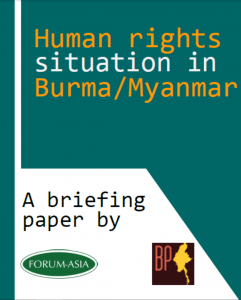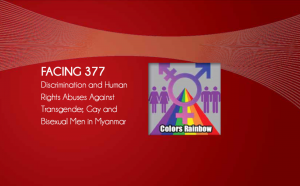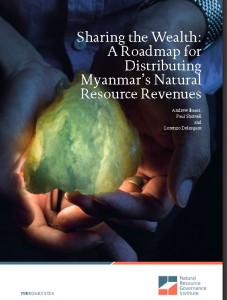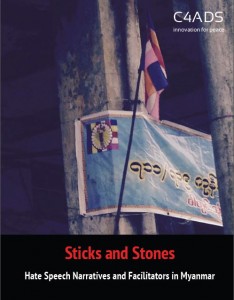Military Regime (163 found)
Statement: WLB urges new NLD-led government, and donors, to start afresh with the peace process
WLB urges new NLD-led government, and donors, to start afresh with the peace process The Women’s League of Burma (WLB) is gravely concerned at the recent fighting in northern Shan State between the Restoration Council of Shan State (RCSS) and the Ta’ang National Liberation Army (TNLA), which has displaced over 5,000 civilians and is cleaving ethnic rifts among communities which have co-existed peacefully for generations […]
• • •Human Rights situation in Burma/Myanmar
 The year 2015 will be remembered as a momentous year for Burma/Myanmar as the National League for Democracy (NLD), led by Daw Aung San Suu Kyi, clinched an emphatic victory in the 8 November polls. However, the main challenges that impede a full and genuine democratic transition remain.
The year 2015 will be remembered as a momentous year for Burma/Myanmar as the National League for Democracy (NLD), led by Daw Aung San Suu Kyi, clinched an emphatic victory in the 8 November polls. However, the main challenges that impede a full and genuine democratic transition remain.
Toungoo Field Report: December 2013 to December 2014
 This Field Report describes events occurring in Toungoo District between December 2013 and December 2014. During this period, KHRG mainly received reports from Thandaunggyi Township and surrounding areas […]
This Field Report describes events occurring in Toungoo District between December 2013 and December 2014. During this period, KHRG mainly received reports from Thandaunggyi Township and surrounding areas […]
Open Letter to Permanent Representatives of Member and Observer States of the UN Human Rights Council
Dear Excellencies,
We write to you regarding Burma/Myanmar as civil society groups working on the ground in the country. We strongly urge you to continue the UN Human Rights Council resolution on Burma/Myanmar and as in past years extend the mandate of the Special Rapporteur under Item 4 of the Council’s agenda. At this important juncture in the country’s history, we request the Council and the Special Rapporteur to work towards establishing clearly benchmarked guidelines that will act as a road map for the future of human rights in Burma/Myanmar […]
• • •Myanmar: Annual Report Country Entry 2016
Authorities failed to address rising religious intolerance and incitement to discrimination and violence against Muslims, allowing hardline Buddhist nationalist groups to grow in power and influence ahead of the November general elections […]
• • •Facing 377 Discrimination and Human Rights Abuses Against Transgender
 Following military coups in 1962 and 1988, multiple military regimes have ruled over Myanmar (formerly known as Burma). Widespread human rights abuses conducted by police and military against the general public and ethnic minorities are well known and documented […]
Following military coups in 1962 and 1988, multiple military regimes have ruled over Myanmar (formerly known as Burma). Widespread human rights abuses conducted by police and military against the general public and ethnic minorities are well known and documented […]
Practical steps the NLD-led government can take in its first six months to address human rights violations against the Rohingya
For decades successive regimes and governments in Burma have pursued a twin-track policy of impoverishment and human rights violations in order to attempt to wipe out the Rohingya community from Arakan State […]
• • •Sharing the Wealth: A Roadmap for Distributing Myanmar’s Natural Resource Revenues
 Oil, natural gas and mineral revenues are generated in nearly every state and region in Myanmar, with the most important onshore interests lying in Bago, Kachin, Magway, Mandalay, Sagaing, Shan and Tanintharyi. In these areas and others, extractive activities have significantly impacted livelihoods and the local environment […]
Oil, natural gas and mineral revenues are generated in nearly every state and region in Myanmar, with the most important onshore interests lying in Bago, Kachin, Magway, Mandalay, Sagaing, Shan and Tanintharyi. In these areas and others, extractive activities have significantly impacted livelihoods and the local environment […]
Protection of People Must be Priority in Burma’s Protracted Peace Process
In a new briefing paper titled, “Protection of People Must be Priority in Burma’s Protracted Peace Process” released to mark Union Day, Burma Partnership highlights how the peace process of the Thein Sein Government has been unsuccessful, ultimately leading to many powerful ethnic armed organizations (EAOs) refusing to sign the nationwide ceasefire agreement (NCA). It also resulted in a call by civil society organizations to postpone the Union Peace Conference […]
• • •Sticks and Stones: Hate Speech Narratives and Facilitators in Myanmar
 Conditions for Muslims have steadily declined in Myanmar, with the Rohingya Muslims of Rakhine State facing the gravest threat. In 2012, the country was rocked by the worst sectarian violence in over 50 years, resulting in over 200 killed and 140,000 displaced, most of them being the Rohingya […]
Conditions for Muslims have steadily declined in Myanmar, with the Rohingya Muslims of Rakhine State facing the gravest threat. In 2012, the country was rocked by the worst sectarian violence in over 50 years, resulting in over 200 killed and 140,000 displaced, most of them being the Rohingya […]

 All posts
All posts